Does chronic kidney disease affect the complications and prognosis of patients after primary colorectal cancer surgery?
INTRODUCTION
Colorectal cancer(CRC)is the third most common malignant tumor and ranks the second leading cause of cancer-related deaths around the world.Nearly 1.8 million new CRC patients and 0.7 million cancerrelated deaths occur each year[1].Radical resection is the only curative treatment for early-stage CRC[2,3],and comprehensive therapy(such as immune therapy,radiotherapy,chemotherapy and surgery)is recommended for advanced-stage CRC[4-8].
It is estimated that approximately 500 million adults worldwide are diagnosed with chronic kidney disease(CKD),but the prevalence varies greatly among different countries[9,10].CKD can increase mortality and morbidity,and it involves an economic burden as well[11,12].Some key pathophysiological causes of CKD may contribute to increased postoperative morbidity(including excessive arterial calcification,endothelial dysfunction and increased levels of inflammatory factors)[13].
As previous studies reported,patients with CKD might increase the risk of CRC[14];however,the effect of CKD on complications and prognosis after CRC surgery remains controversial.Some studies held the view that CKD had no effect on surgical complications[15,16].Moreover,other studies believed that CKD increased postoperative complications[17,18].Furthermore,the prognosis remained unclear as well.Therefore,our study aimed to analyze whether CKD had an effect on the complications and prognosis of CRC patients who underwent primary CRC surgery.
MATERIALS AND METHODS
This meta-analysis conformed to the Preferred Reporting method for Systematic Reviews and Meta-Analyses(PRISMA)statement[19].The register number of this meta-analysis was CRD42021266160.
Literature search strategy
We searched the PubMed,Embase,Cochrane Library databases and CNKI from inception to March 14,2022.There were two key items in this search strategy: chronic kidney disease and colorectal cancer.To expand the search scope,in terms of chronic kidney disease,we used "kidney" OR "dialysis" OR "hemodialysis" OR "estimated glomerular filtration rate".Colorectal cancer was searched as follows: "rectal cancer" OR "colorectal cancer" OR "colon cancer" OR "rectal neoplasm" OR "colorectal neoplasm" OR "colon neoplasm" OR "rectal tumor" OR "colorectal tumor" OR "colon tumor".Then,two key items were combined with "AND".We restricted the search language to Chinese and English,and we limited the searching scope to titles and abstracts.In addition,we use Reference Citation Analysis(https://www.referencecitationanalysis.com)to retrieve relevant literature.
Inclusion and exclusion criteria
The inclusion criteria were as follows:(1)Studies that included patients undergoing colorectal surgery;(2)Studies that compared the CKD group and the non-CKD group of CRC patients;and(3)Study outcomes included the complications or prognosis.The exclusion criteria were as follows:(1)Studies with insufficient data on complications or prognosis;and(2)Case reports,comments,letter to editor,conferences and reviews.The procedures of inclusion and exclusion criteria were carried out by two reviewers separately,and if there was a disagreement,it was settled by discussion with another reviewer.
Sex,age,ASA score,T staging and N staging were included for baseline information analysis.The CKD group had an older age(OR = 8.67,95%CI: 5.73-11.61,
< 0.01)and a higher proportion of ASA 3-4 grade(OR = 10.27,95%CI: 2.98-35.35,
< 0.01)after pooling the baseline information.As for other baseline information,no significant difference was found between the two groups(
> 0.05)(Table 2).
60 This she will consent to do, for she does not know that it is you who let them fall on it; but no one can wash them out but one born of Christian folk: it cannot be done by one of a pack of trolls; and then I will say that no one shall ever be my bride but the woman who can do this,61 and I know that you can
Study selection
Two reviewers searched the databases separately.The titles and abstracts were screened after removing duplicates,after which full texts were evaluated for eligibility.Disagreement was settled by another reviewer.
Data extraction
Two reviewers extracted and cross-checked the data.The data which were extracted were:(1)Publication year,first author,country,sample size,study design,Newcastle-Ottawa Scale(NOS)score and the definition of the CKD group and the non-CKD group;(2)The baseline information included age,sex,comorbidities,American Society of Anesthesiologists(ASA)score and tumor stage;(3)The surgery-related information included surgery type and surgery method;(4)Postoperative complications included anastomotic leakage(divided into three groups: grade A,grad B and grade C.Grade A needed no active intervention,grade B needed active intervention and grade C needed reoperation)[20],pulmonary complications,intestinal obstruction,surgical site infection,postoperative bleeding and short-term death ;and(5)Overall survival(OS)and disease-free survival(DFS).
The aim of this study was to conduct meta-analysis of current studies and to analyze whether CKD had specific effect on the outcomes after CRC surgery.
Outcomes
The primary outcome referred to the short-term outcome,which was equal to postoperative complications(including anastomotic leakage,intestinal obstruction,surgical site infection,postoperative bleeding,pulmonary complications and short-term death during the hospital stay).The second outcome was the long-term prognosis of OS and DFS.
Quality assessment
The assessment of the included studies was according to the Newcastle-Ottawa Scale(NOS)[21].Nine points represented high-quality studies,seven to eight points represented medium-quality studies and scores less than seven points represented low-quality studies.
So when the day approached he put on his invisible belt, took a sack of gold pieces with him, and slipping into her room in the middle of the night, he placed the bag of gold beside her bed and returned to his sheep
Statistical analysis
In the current meta-analysis,the pooled prognosis(OS and DFS)used hazard ratios(HRs)and 95%CIs,and the HRs were extracted from COX analyses.If no available data reported the HRs from COX analyses,then we extracted the HRs from Kaplan-Meier survival curves[22].The mean ± SD was used for continuous variables,and proportions were used for categorical variables.Mean differences(MDs)/ odds ratios(ORs)plus 95%CIs were calculated for continuous and dichotomous variables.Statistical heterogeneity was analyzed using the
and the chi-square test[23,24].When
> 50%,we used the random effects model,in this model,
< 0.1 was considered to be statistically significant.We used the fixed effects model,in this model,when
≤ 50%,and
< 0.05 was considered to be statistically significant.All the statistical analysis was performed using RevMan 5.3(The Cochrane Collaboration,London,United Kingdom).
This time I catch it, and hold it up for her to see. Her eyes twinkle. Does she pity me? Perhaps. I do not care, though. I am just so happy to gaze at her. And for the first time in so long, I feel my heart move with emotion.
RESULTS
Study selection
We identified 903 studies(266 studies were obtained from PubMed,509 studies were obtained from Embase,103 studies were obtained from the Cochrane Library and 25 studies were obtained from CNKI).A total of 903 studies were included after removed duplicate,671 studies were left for initial evaluation.After titles and abstracts were screened,9 studies were left for full-text screening.Finally,nine studies[15-18,25-29]were included(Figure 1).

Patient characteristics and quality assessment
A total of nine studies[15-18,25-29]including 47771 patients,were enrolled in the current meta-analysis.As for publishing countries,five of nine studies were conducted in Japan,and the other studies were in the United States,the United Kingdom,Canada and China.The publication years were from 2012 to 2022,eight studies were retrospective studies,only one study was a prospective study.The study dates were from 2001 to 2020.The NOS score and definitions of the CKD group and the non-CKD group areshown in Table 1.Six studies reported that the modification of diet in renal disease equation was used to estimate the estimated glomerular filtration rates(eGFR)[16,18,25,27-29];however,the method used in the other studies was unclear[15,17,26](see Table 1).
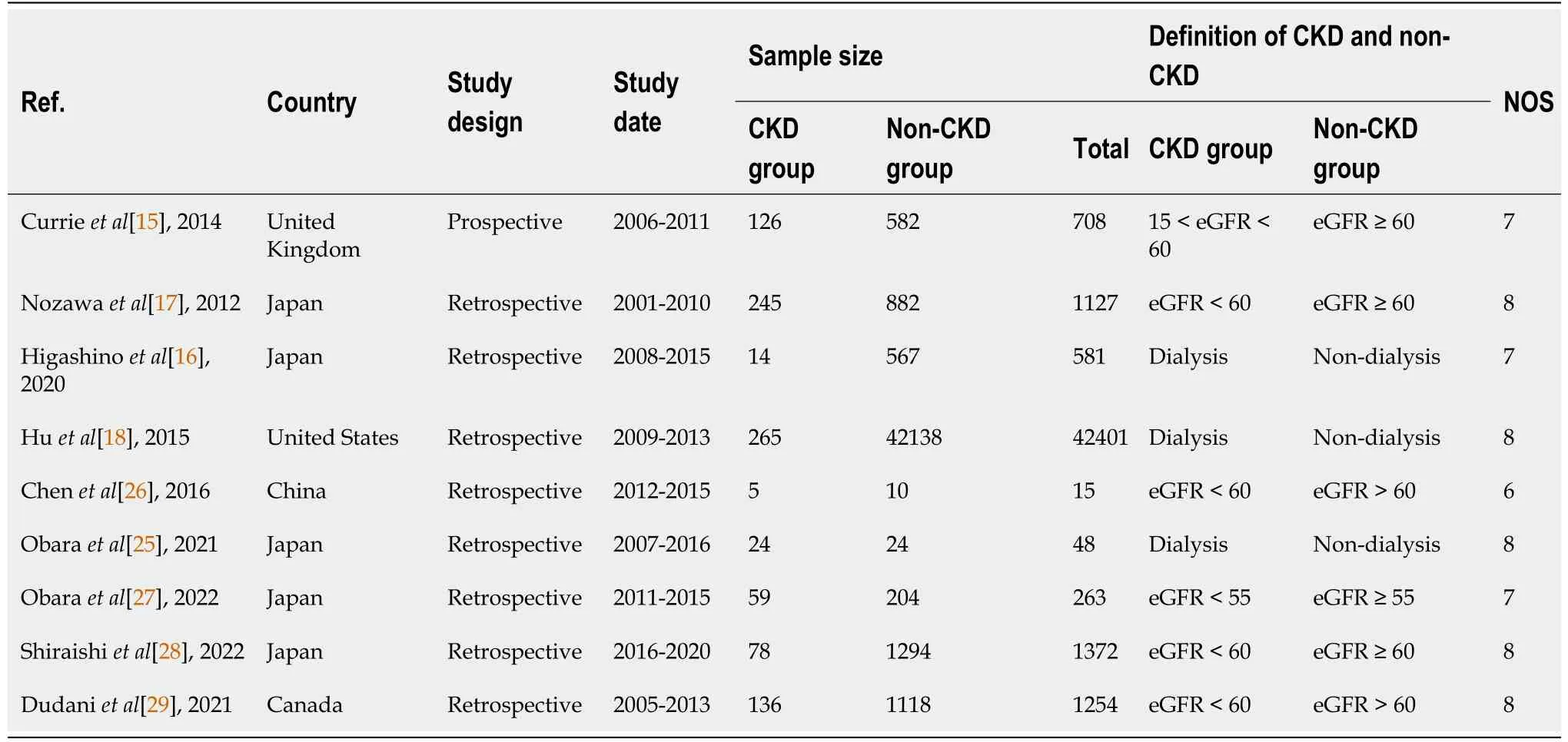
Baseline information
He spread carefully out on a fine white cloth his Mirabelle plums, which looked for all the world as if they had been freshly gathered, and when he saw the Princess coming out of church he began to call out in a feigned49 voice: Fine plums! lovely plums! How much are they? said the Princess
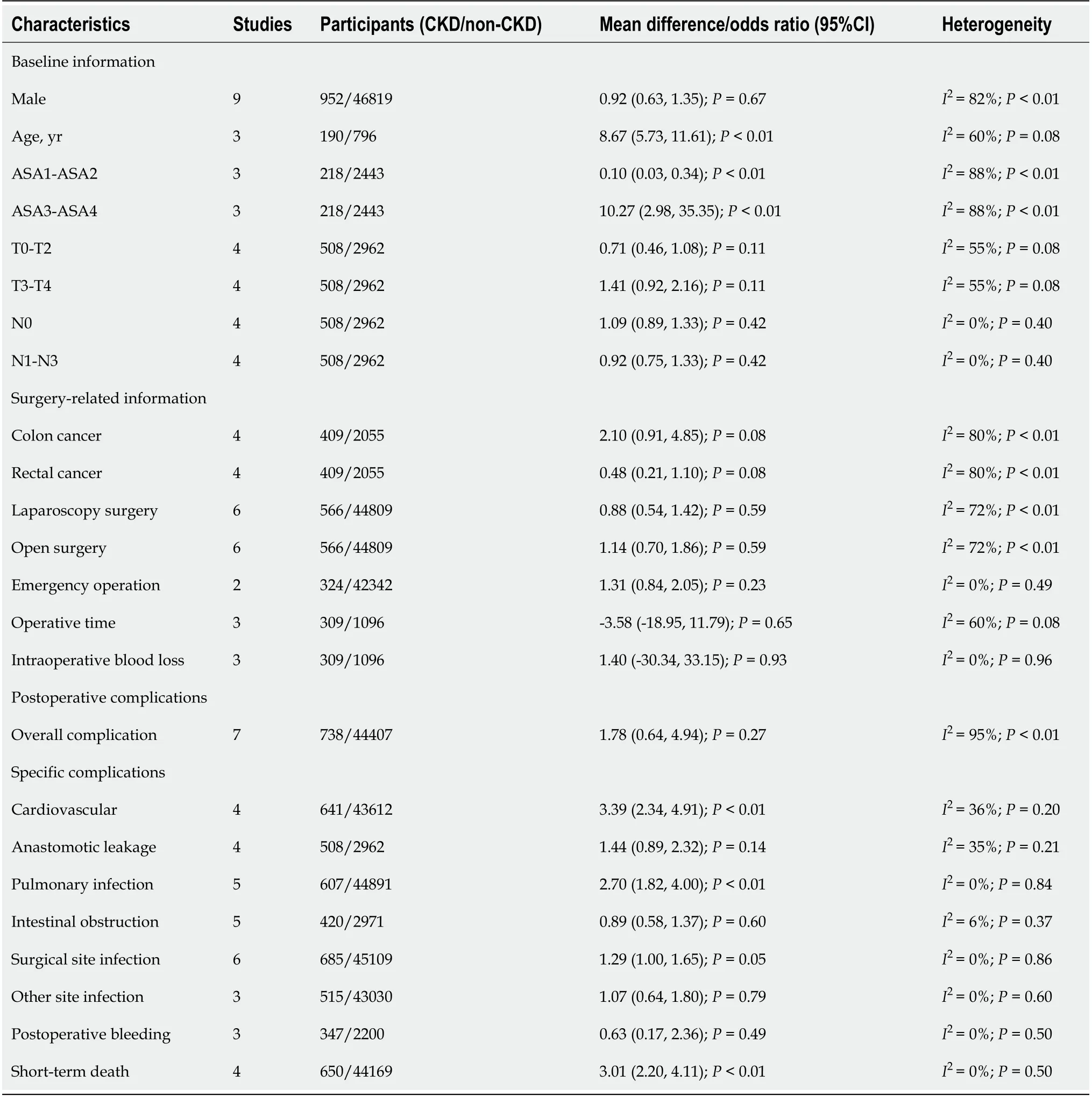
Surgery-related information
We compared the surgery-related information between the two groups,and it was found no significant difference in terms of laparoscopic surgery,open surgery,emergency operation,intraoperative blood loss or operation time(
> 0.05).But,the CKD group had higher proportion of patients who underwent colon cancer surgery(OR = 2.10,95%CI: 0.91-4.85,
= 0.08)(Table 2).
“The Power of twelve men!” said the Finland woman; “that would be of very little use.” But she went to a shelf and took down and unrolled a large skin, on which were inscribed6 wonderful characters, and she read till the perspiration7 ran down from her forehead. But the reindeer begged so hard for little Gerda, and Gerda looked at the Finland woman with such beseeching8 tearful eyes, that her own eyes began to twinkle again; so she drew the reindeer into a corner, and whispered to him while she laid a fresh piece of ice on his head, “Little Kay is really with the Snow Queen, but he finds everything there so much to his taste and his liking9, that he believes it is the finest place in the world; but this is because he has a piece of broken glass in his heart, and a little piece of glass in his eye. These must be taken out, or he will never be a human being again, and the Snow Queen will retain her power over him.”
Postoperative complications
There was no significant difference in terms of overall postoperative complications(OR = 1.78,95%CI: 0.64-4.94,
= 0.27).We performed subgroup analyses of the dialysis and non-dialysis groups and no significant difference was found between the non-dialysis group(OR = 1.21,95%CI: 0.97-1.50,
= 0.09)and the dialysis group(OR = 2.67,95%CI: 0.29-24.23,
= 0.38)(Figure 2).
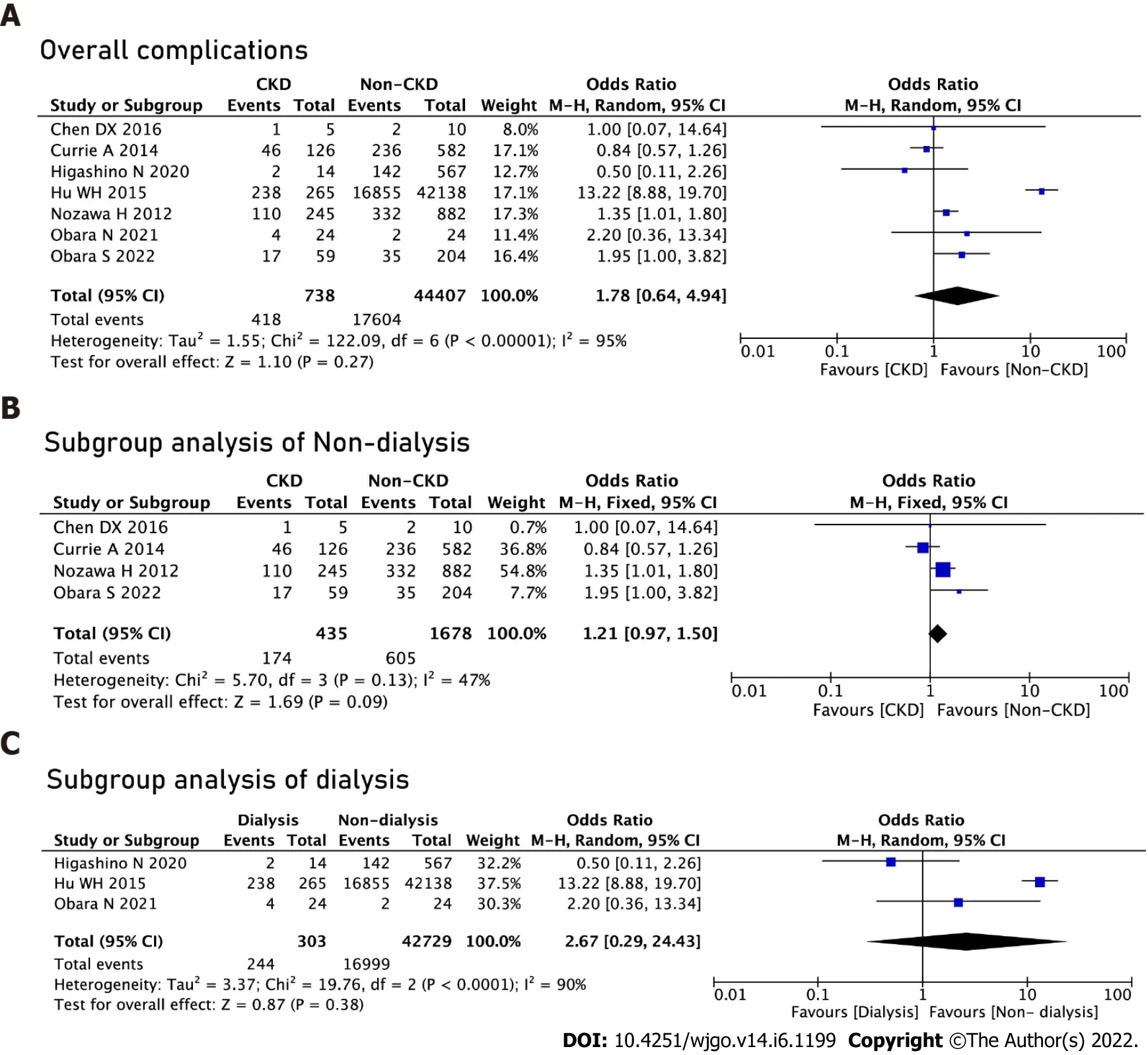
We conducted the analysis of specific complications,and we found that the CKD group had higher rates of pulmonary infections(OR = 2.70,95%CI: 1.82-4.00,
< 0.01),cardiovascular complications(OR = 3.39,95%CI: 2.34-4.91,
< 0.01)and short-term death(OR = 3.01,95%CI: 2.20-4.11,
< 0.01)(Table 2).
OS and DFS
The CKD group had worse OS(HR = 1.51,95%CI: 1.04-2.20,
= 0.03)after pooling up the HRs.We performed subgroup analyses of the dialysis and non-dialysis groups and no significant difference was found in the non-dialysis group(HR = 1.20,95%CI: 0.98-1.47,
= 0.08).The dialysis group had worse OS(HR = 3.36,95%CI: 1.92-5.90,
< 0.01)than the non-dialysis group(Figure 3).
Some parameters that were insufficient for meta-analysis included cancer-related death,blood transfusion,reoperation rate,adjuvant chemotherapy and the R0 resection rate.However,attention should be given to these parameters.In addition to OS and DFS,cancer-specific survival(CSS)could reflect tumor-related deaths.Obara
[25]reported that CSS was a negative parameter between the two groups,and the major long-term cause of death in CKD patients might be cardiovascular death.Blood transfusion,a factor that influences the prognosis,might have been more common in the CKD group.Therefore,for surgeons,careful control during the operation and perioperative management of CKD are necessary to reduce blood transfusion.
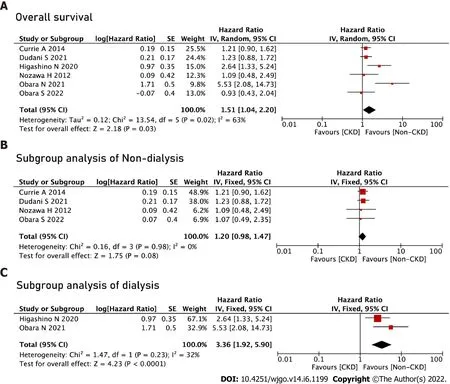

Sensitivity analysis
Some limitations were existing.First,only nine studies were included,and the sample size was relatively small.Second,the cutoff for CKD differed among the included study.Five studies reported that the cutoff eGFR was 60 mL/min/1.73 m
,one study reported that the cutoff value was 55 mL/min/1.73 m
and the remaining three studies used hemodialysis as the cutoff.Obvious heterogeneity was seen after pooling the data in terms of complications,OS and DFS,therefore,we performed a subgroup analysis,and heterogeneity was reduced.Third,we extracted all of the data that could be analyzed in this study,however,some information was lacking,such as postoperative hospital stay,cancer-related death,blood transfusion,reoperation rate,adjuvant chemotherapy,R0 resection rate,perioperative chemo-radiotherapy and completion of the schedule of chemo-radiotherapy.Fourth,some of the survival data were extracted from the Kaplan-Meier survival curves,which might result in inaccuracies.Finally,among the specific postoperative complications,it was found that pulmonary infection,cardiovascular complications and short-term death were significantly different between the groups;however,this conclusion was based on only four studies,including two CKD studies and two dialysis studies,which would result in heterogeneity.Therefore,multicenter,high-quality and wellcontrolled prospective studies including comprehensive baseline information comparing the complications,OS,DFS and CSS should be conducted.
DISCUSSION
A total of nine studies were included in this meta-analysis.There was no significant difference in terms of overall postoperative complications after pooling all of the data.As for prognosis,the CKD group had worse OS and DFS.We performed subgroup analysis of the dialysis and non-dialysis groups.Dialysis was associated with a worse OS and DFS as well.
The classification of renal function is mainly based on the eGFR[30]and different renal function classifications might have an impact on surgery outcomes.As previous studies have reported,CKD could increase postoperative complications after gastric cancer surgery and hepatocellular carcinoma surgery,and the complications included anastomotic leakage and short-term postoperative death[31-33].In addition,patients with concurrent CKD and cancer have a poor prognosis[32].In terms of CRC,although an impact of renal function on postoperative complications and prognosis has been reported,it remains controversial.
In this study,there was no significant difference in terms of overall postoperative complications,and we chose the random effect model to conduct the analysis because of the high heterogeneity among studies.We conducted the analysis of specific complications,and we found that the CKD group had higher rates of pulmonary infection,cardiovascular complications and short-term death.The possible reason was that patients undergoing colorectal surgery might experience fluid overload due to nutritional support during non-oral periods.Therefore,these events might increase the risk of lungrelated complications[18].Cardiovascular complications might be associated with endothelial dysfunction in CKD patients[16,34].Furthermore,patients with CKD are in a relatively immunosuppressive state due to nutritional deficiencies,the lymphocyte suppression and the loss of serum immune system components,which might result in an increase in infectious diseases and short-term deaths after surgery[35].
The CKD group had worse OS rates DFS rates.The probable reason was that CKD was associated with endothelial dysfunction,malnutrition,volume overload or changes in calcium and phosphorus metabolism,and the dysfunction would cause higher rates of cardiovascular events[13,36].In addition,an association between postoperative complications and cancer-related poor prognosis has been reported in esophageal,gastric and colorectal cancer;therefore,higher rates of postoperative complications might result in a poor prognosis[37,38].Moreover,postoperative complications and perioperative blood loss can suppress immune function,which might be a factor for promoting cancer recurrence[39,40].We performed subgroup analyses of the dialysis and non-dialysis groups.Dialysis was associated with worse OS and DFS.Therefore,the distinction in OS and DFS between the two groups might be mainly determined by dialysis.
So he took three strong sacks and put a man in each of them, and fastened them up so tightly that they couldn t get out, and then he threw them all into the river; and that was the end of the three rogues
The CKD group had worse DFS(HR = 1.41,95%CI: 1.12-1.78,
< 0.01).We performed subgroup analyses of the dialysis and non-dialysis groups,and no significant difference was found in the nondialysis group(HR = 1.27,95%CI: 0.97-1.66,
= 0.08).The dialysis group had worse OS(HR = 1.95,95%CI: 1.23-3.10,
< 0.01)than the non-dialysis group(Figure 4).
Back in England, Carlton Jackson relates, some Eighth Army veterans were belting out “Lili Marleen” one night in a pub frequested by song publisher J. J. Phillips. He remarked that village police might think they were German spies. “If you re so fired up about it,” a soldier yelled, “why don t you write us some English words?”
We performed repeated meta-analysis by omitting each study at a time,in our meta-analysis,the exclusion of any one of the included studies did not alter the results.
In the pastor’s old car they drove to her home on the other side of town. Together they knocked on her apartment door. When she opened it, the pastor witnessed the tearful, joyful18 and thrilling reunion of husband and wife.
CONCLUSION
In conclusion,preexisting CKD was associated with higher rates of pulmonary infection,higher rates of short-term death,and worse OS and DFS following CRC surgery.
ARTICLE HIGHLIGHTS
Research background
Colorectal cancer(CRC)is the third most common malignant tumor and the second leading cause of cancer deaths worldwide.Several key pathophysiological causes of chronic kidney disease(CKD)may lead to increased postoperative morbidity,including excessive arterial calcification,endothelial dysfunction and increased levels of inflammatory factors.Previous studies have shown that patients with CKD might have an increased risk of CRC;however,the impact of CKD on complications and prognosis after CRC surgery is controversial.
god said: when i made the woman she had to be special. i made her shoulders strong enough to carry the weight of the world; yet, gentle enough to give comfort
Research motivation
We would if we were taught to put the fish back when we were young. For we would have learned the truth. The decision to do right lives fresh and fragrant10 in our memory. It is a story we will proudly tell our friends and grandchildren. Not about how we had a chance to beat the system and took it, but about how we did the right thing and were forever strengthened.
Research objectives
The aim of this study is to provide some recommendations for clinical work by investigating the impact of CKD on postoperative complications and prognosis in colorectal cancer.
Research methods
We searched the PubMed,Embase,Cochrane Library databases and CNKI,from inception to March 14,2022.Newcastle-Ottawa Scale was used for the quality assessment in this meta-analysis,and we used RevMan 5.3 was used for data analysis.
Esben had noticed that she had such a dove; so when he arrived in the courtyard he shook the peas out of the bag, and the dove came fluttering down to pick them up
Research results
A total of nine studies including 47771 patients were included in this meta-analysis.No significant difference was found in terms of overall postoperative complications.We analyzed the specific complications and found that the CKD group had higher rates of pulmonary infection,cardiovascular complications and short-term death.After pooling the hazard ratios,the CKD group had worse overall survival(OS).
Research conclusions
Preexisting CKD was associated with higher rates of pulmonary infection,higher rates of short-term death,and worse OS and poorer disease-free survival(DFS)following CRC surgery.
Research perspectives
Based on the results and limitations of this research,multicenter,high-quality and well-controlled prospective studies including comprehensive baseline information comparing the complications,OS,DFS and CSS should be performed in the future.
ACKNOWLEDGEMENTS
We thank the Department of Gastrointestinal Surgery,of The First Affiliated Hospital of Chongqing Medical University for their contributions.
FOOTNOTES
Liu XY and Bin Zhang are co-first authors;Liu XY and Zhang B contributed to data extraction;Peng D contributed to quality assessments and writing-origin draft;Peng D and Liu XY contributed to data analysis;Peng D,Liu XY,Zhang B,Cheng YX,Tao W,Yuan C,and Wei ZQ contributed to writing-review and editing;The final manuscript was read and approved by all of our authors.
The authors declare that they have no competing interests.
However, the king was much too anxious to see his daughter married to listen to any excuses, and he declared that a dress must be put together somehow for the bride to wear
The authors have read the PRISMA 2009 Checklist,and the manuscript was prepared and revised according to the PRISMA 2009 Checklist.
This article is an open-access article that was selected by an in-house editor and fully peer-reviewed by external reviewers.It is distributed in accordance with the Creative Commons Attribution NonCommercial(CC BYNC 4.0)license,which permits others to distribute,remix,adapt,build upon this work non-commercially,and license their derivative works on different terms,provided the original work is properly cited and the use is noncommercial.See: https://creativecommons.org/Licenses/by-nc/4.0/
China
Xiao-Yu Liu 0000-0001-9448-4592;Bin Zhang 0000-0002-7200-6896;Yu-Xi Cheng 0000-0002-9220-7855;Wei Tao 0000-0002-3149-0642;Chao Yuan 0000-0002-7026-6109;Zheng-Qiang Wei 0000-0001-5842-7910;Dong Peng 0000-0003-4050-4337.
Zhang H
A
Zhang H
1 Bray F,Ferlay J,Soerjomataram I,Siegel RL,Torre LA,Jemal A.Global cancer statistics 2018: GLOBOCAN estimates of incidence and mortality worldwide for 36 cancers in 185 countries.
2018;68: 394-424[PMID: 30207593 DOI: 10.3322/caac.21492]
2 Ergun Y,Bal O,Dogan M,Ucar G,Dirikoc M,Acikgoz Y,Bacaksiz F,Uncu D.Does primary tumor resection contribute to overall survival in unresectable synchronous metastatic colorectal cancer?
2020;25: 14[PMID: 32174986 DOI: 10.4103/jrms.JRMS_1056_18]
3 Bundred NJ.Erratum to "Impact of Oncotype DX Breast Recurrence Score testing on adjuvant chemotherapy use in early breast cancer: Real world experience in Greater Manchester,UK"[Eur J Surg Oncol 43(5)(2017)931-937].
2018;44: 194[PMID: 29174199 DOI: 10.1016/j.ejso.2017.06.002]
4 Peng D,Cheng YX,Cheng Y.Improved Overall Survival of Colorectal Cancer under Multidisciplinary Team: A Meta-Analysis.
2021;2021: 5541613[PMID: 33997003 DOI: 10.1155/2021/5541613]
5 Feliu J,Espinosa E,Basterretxea L,Paredero I,Llabrés E,Jiménez-Munárriz B,Antonio-Rebollo M,Losada B,Pinto A,Custodio AB,Del Mar Muñoz M,Gómez-Mediavilla J,Torregrosa MD,Soler G,Cruz P,Higuera O,Molina-Garrido MJ.Prediction of Chemotoxicity,Unplanned Hospitalizations and Early Death in Older Patients with Colorectal Cancer Treated with Chemotherapy.
2021;14: 127[PMID: 35008291 DOI: 10.3390/cancers14010127]
6 Lee J,Koom WS,Byun HK,Yang G,Kim MS,Park EJ,Ahn JB,Beom SH,Kim HS,Shin SJ,Kim K,Chang JS.Metastasis-Directed Radiotherapy for Oligoprogressive or Oligopersistent Metastatic Colorectal Cancer.
2021;S1533-0028(21)00120[PMID: 34903471 DOI: 10.1016/j.clcc.2021.10.009]
7 Wang D,Zhang H,Xiang T,Wang G.Clinical Application of Adaptive Immune Therapy in MSS Colorectal Cancer Patients.
2021;12: 762341[PMID: 34721435 DOI: 10.3389/fimmu.2021.762341]
8 Naumann RW,Coleman RL,Brown J,Moore KN.Corrigendum to "Phase III trials in ovarian cancer: The evolving landscape of front line therapy"[Gynecol.Oncol.153(2019)436-444].
2020;156: 512-513[PMID: 31859001 DOI: 10.1016/j.ygyno.2019.12.007]
9 Mills KT,Xu Y,Zhang W,Bundy JD,Chen CS,Kelly TN,Chen J,He J.A systematic analysis of worldwide populationbased data on the global burden of chronic kidney disease in 2010.
2015;88: 950-957[PMID: 26221752 DOI: 10.1038/ki.2015.230]
10 Brück K,Stel VS,Gambaro G,Hallan S,Völzke H,Ärnlöv J,Kastarinen M,Guessous I,Vinhas J,Stengel B,Brenner H,Chudek J,Romundstad S,Tomson C,Gonzalez AO,Bello AK,Ferrieres J,Palmieri L,Browne G,Capuano V,Van Biesen W,Zoccali C,Gansevoort R,Navis G,Rothenbacher D,Ferraro PM,Nitsch D,Wanner C,Jager KJ;European CKD Burden Consortium.CKD Prevalence Varies across the European General Population.
2016;27: 2135-2147[PMID: 26701975 DOI: 10.1681/ASN.2015050542]
11 Cirakoglu A,Yuce A,Benli E,Kasko Arici Y,Dugeroglu H,Ogreden E.Is erectile dysfunction an early clinical symptom of chronic kidney disease?
2021;24: 24-28[PMID: 34096824 DOI: 10.1080/13685538.2021.1936483]
12 Chen TK,Knicely DH,Grams ME.Chronic Kidney Disease Diagnosis and Management: A Review.
2019;322: 1294-1304[PMID: 31573641 DOI: 10.1001/jama.2019.14745]
13 Gansevoort RT,Correa-Rotter R,Hemmelgarn BR,Jafar TH,Heerspink HJ,Mann JF,Matsushita K,Wen CP.Chronic kidney disease and cardiovascular risk: epidemiology,mechanisms,and prevention.
2013;382: 339-352[PMID: 23727170 DOI: 10.1016/S0140-6736(13)60595-4]
14 Wu MY,Chang TC,Chao TY,Huang MT,Lin HW.Risk of colorectal cancer in chronic kidney disease: a matched cohort study based on administrative data.
2013;20: 3885-3891[PMID: 23807660 DOI: 10.1245/s10434-013-3065-8]
15 Currie A,Malietzis G,Askari A,Nachiappan S,Swift P,Jenkins JT,Faiz OD,Kennedy RH.Impact of chronic kidney disease on postoperative outcome following colorectal cancer surgery.
2014;16: 879-885[PMID: 24836209 DOI: 10.1111/codi.12665]
16 Higashino N,Matsuda T,Hasegawa H,Yamashita K,Sakamoto H,Fujikawa M,Yamamoto M,Kanaji S,Oshikiri T,Nakamura T,Suzuki S,Kakeji Y.Outcomes of Laparoscopic Surgery in Colorectal Cancer Patients With Dialysis.
2020;40: 2165-2170[PMID: 32234910 DOI: 10.21873/anticanres.14176]
17 Nozawa H,Kitayama J,Sunami E,Watanabe T.Impact of chronic kidney disease on outcomes of surgical resection for primary colorectal cancer: a retrospective cohort review.
2012;55: 948-956[PMID: 22874601 DOI: 10.1097/DCR.0b013e3182600db7]
18 Hu WH,Cajas-Monson LC,Eisenstein S,Parry L,Ramamoorthy S.Association of dialysis with adverse postoperative outcomes in colorectal cancer-an analysis of ACS-NSQIP.
2015;30: 1557-1562[PMID: 26243472 DOI: 10.1007/s00384-015-2347-y]
19 Moher D,Liberati A,Tetzlaff J,Altman DG;PRISMA Group.Preferred reporting items for systematic reviews and metaanalyses: the PRISMA statement.
2009;6: e1000097[PMID: 19621072 DOI: 10.1371/journal.pmed.1000097]
20 Rahbari NN,Weitz J,Hohenberger W,Heald RJ,Moran B,Ulrich A,Holm T,Wong WD,Tiret E,Moriya Y,Laurberg S,den Dulk M,van de Velde C,Büchler MW.Definition and grading of anastomotic leakage following anterior resection of the rectum: a proposal by the International Study Group of Rectal Cancer.
2010;147: 339-351[PMID: 20004450 DOI: 10.1016/j.surg.2009.10.012]
21 Stang A.Critical evaluation of the Newcastle-Ottawa scale for the assessment of the quality of nonrandomized studies in meta-analyses.
2010;25: 603-605[PMID: 20652370 DOI: 10.1007/s10654-010-9491-z]
22 Tierney JF,Stewart LA,Ghersi D,Burdett S,Sydes MR.Practical methods for incorporating summary time-to-event data into meta-analysis.
2007;8: 16[PMID: 17555582 DOI: 10.1186/1745-6215-8-16]
23 Ioannidis JP.Interpretation of tests of heterogeneity and bias in meta-analysis.
2008;14: 951-957[PMID: 19018930 DOI: 10.1111/j.1365-2753.2008.00986.x]
24 Higgins JP,Thompson SG,Deeks JJ,Altman DG.Measuring inconsistency in meta-analyses.
2003;327: 557-560[PMID: 12958120 DOI: 10.1136/bmj.327.7414.557]
25 Obara N,Hirano Y,Ishii T,Kondo H,Hara K,Wang L,Asari M,Ito M,Yamaguchi S.Laparoscopic Surgery for Colorectal Cancer in Patients on Hemodialysis: A Propensity Score-matched Analysis.
2021;41: 993-997[PMID: 33517306 DOI: 10.21873/anticanres.14853]
26 Chen DX,Zhan XA,Guo QS,Zhou XF,Xu XJ.[Clinical analysis of laparoscopic surgery in patients with maintenance hemodialysis and colon cancer].
2016;96: 1441-1443[PMID: 27266353 DOI: 10.3760/cma.j.issn.0376-2491.2016.18.011]
27 Obara S,Koyama F,Kuge H,Nakamoto T,Ikeda N,Iwasa Y,Takei T,Sadamitsu T,Fujimoto K,Harada S,Sho M.Effect of preoperative asymptomatic renal dysfunction on the clinical course after colectomy for colon cancer.
2022;52: 106-113[PMID: 34455492 DOI: 10.1007/s00595-021-02363-w]
28 Shiraishi T,Tominaga T,Nonaka T,Hashimoto S,Hamada K,Araki M,Sumida Y,Takeshita H,Fukuoka H,Wada H,To K,Yamashita M,Tanaka K,Sawai T,Nagayasu T.Effect of hemodialysis on short-term outcomes after colon cancer surgery.
2022;17: e0262531[PMID: 35020769 DOI: 10.1371/journal.pone.0262531]
29 Dudani S,Marginean H,Gotfrit J,Tang PA,Monzon JG,Dennis K,Kennecke HF,Powell ED,Babak S,Cheung WY,Vickers MM.The Impact of Chronic Kidney Disease in Patients With Locally Advanced Rectal Cancer Treated With Neoadjuvant Chemoradiation.
2021;64: 1471-1478[PMID: 34657078 DOI: 10.1097/DCR.0000000000002116]
30 Levey AS,Eckardt KU,Tsukamoto Y,Levin A,Coresh J,Rossert J,De Zeeuw D,Hostetter TH,Lameire N,Eknoyan G.Definition and classification of chronic kidney disease: a position statement from Kidney Disease: Improving Global Outcomes(KDIGO).
2005;67: 2089-2100[PMID: 15882252 DOI: 10.1111/j.1523-1755.2005.00365.x]
31 Sakurai K,Kubo N,Tamamori Y,Aomatsu N,Nishii T,Tachimori A,Maeda K.Impact of chronic kidney disease on the short- and long-term outcomes of laparoscopic gastrectomy for gastric cancer patients.
2021;16: e0250997[PMID: 33930090 DOI: 10.1371/journal.pone.0250997]
32 Yoshikawa T,Nomi T,Hokuto D,Kamitani N,Matsuo Y,Sho M.Outcomes in Patients with Chronic Kidney Disease After Liver Resection for Hepatocellular Carcinoma.
2021;45: 598-606[PMID: 33089346 DOI: 10.1007/s00268-020-05829-z]
33 Cheng YX,Tao W,Liu XY,Zhang H,Yuan C,Zhang B,Zhang W,Peng D.Does Chronic Kidney Disease Affect the Surgical Outcome and Prognosis of Patients with Gastric Cancer?
2021;1-8[PMID: 34693829 DOI: 10.1080/01635581.2021.1993277]
34 Stafford-Smith M.Heart and kidneys: sharing more than just blood.
2007;20: 65-69[PMID: 17211170 DOI: 10.1097/ACO.0b013e328013f408]
35 Vollmer CM Jr,Lewis RS,Hall BL,Allendorf JD,Beane JD,Behrman SW,Callery MP,Christein JD,Drebin JA,Epelboym I,He J,Pitt HA,Winslow E,Wolfgang C,Strasberg SM.Establishing a quantitative benchmark for morbidity in pancreatoduodenectomy using ACS-NSQIP,the Accordion Severity Grading System,and the Postoperative Morbidity Index.
2015;261: 527-536[PMID: 25268299 DOI: 10.1097/SLA.0000000000000843]
36 Drolet S,Maclean AR,Myers RP,Shaheen AA,Dixon E,Donald Buie W.Morbidity and mortality following colorectal surgery in patients with end-stage renal failure: a population-based study.
2010;53: 1508-1516[PMID: 20940599 DOI: 10.1007/DCR.0b013e3181e8fc8e]
37 Maizel J,Deransy R,Dehedin B,Secq E,Zogheib E,Lewandowski E,Tribouilloy C,Massy ZA,Choukroun G,Slama M.Impact of non-dialysis chronic kidney disease on survival in patients with septic shock.
2013;14: 77[PMID: 23548034 DOI: 10.1186/1471-2369-14-77]
38 Lagarde SM,de Boer JD,ten Kate FJ,Busch OR,Obertop H,van Lanschot JJ.Postoperative complications after esophagectomy for adenocarcinoma of the esophagus are related to timing of death due to recurrence.
2008;247: 71-76[PMID: 18156925 DOI: 10.1097/SLA.0b013e31815b695e]
39 Aoyama T,Oba K,Honda M,Sadahiro S,Hamada C,Mayanagi S,Kanda M,Maeda H,Kashiwabara K,Sakamoto J,Saji S,Yoshikawa T.Impact of postoperative complications on the colorectal cancer survival and recurrence: analyses of pooled individual patients' data from three large phase III randomized trials.
2017;6: 1573-1580[PMID: 28639738 DOI: 10.1002/cam4.1126]
40 Tokunaga M,Tanizawa Y,Bando E,Kawamura T,Terashima M.Poor survival rate in patients with postoperative intraabdominal infectious complications following curative gastrectomy for gastric cancer.
2013;20: 1575-1583[PMID: 23076557 DOI: 10.1245/s10434-012-2720-9]
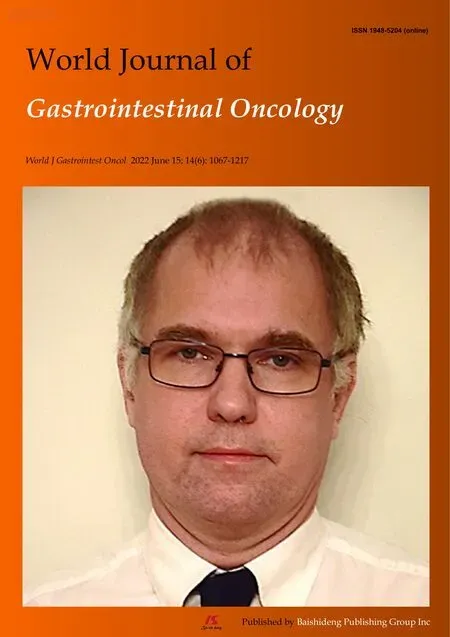 World Journal of Gastrointestinal Oncology2022年6期
World Journal of Gastrointestinal Oncology2022年6期
- World Journal of Gastrointestinal Oncology的其它文章
- Insight on BRAFV600E mutated colorectal cancer immune microenvironment
- Hepatocellular carcinoma and immunotherapy:Beyond immune checkpoint inhibitors
- Biofeedback therapy combined with Baduanjin on quality of life and gastrointestinal hormone level in patients with colorectal cancer
- Characterizing the patient experience during neoadjuvant therapy for pancreatic ductal adenocarcinoma:A qualitative study
- Clinicopathological differences,risk factors and prognostic scores for western patients with intestinal and diffuse-type gastric cancer
- Contemporary,national patterns of surgery after preoperative therapy for stage II/III rectal adenocarcinoma
